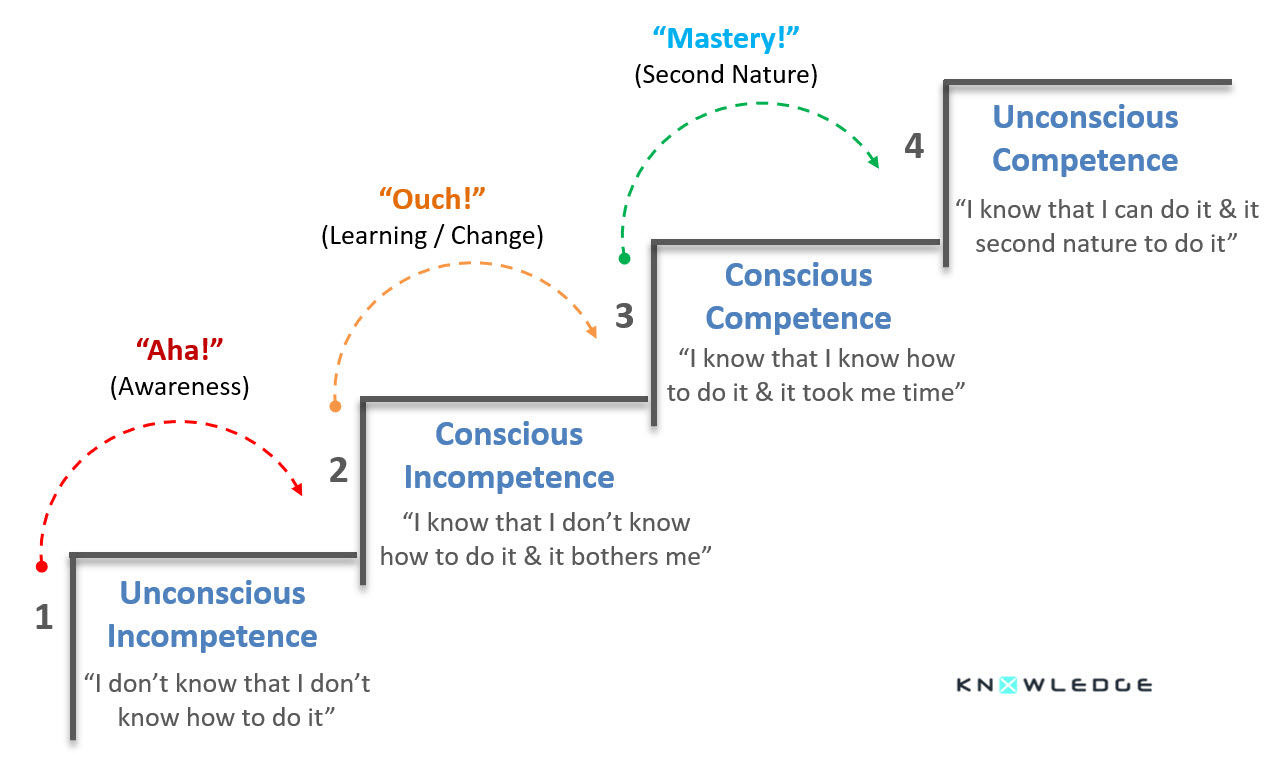Background
The four stages of learning were originally published by Noel Burch of Gordon Training International, although Abraham Maslow is often erroneously credited. It is also known as the “four stages of competence” among a lot of practitioners.
The learning process often felt to be more difficult than it should be due to the down feelings that occur when you make mistakes in learning. Those bad feelings often due to self-blame like; "I don’t know how to do it", "that is not good enough", "I will never learn doing this", etc.
Ironically, doing it right is vital in the learning process. But often we drag ourselves to avoid having bad feelings and deviate from the learning process. The four stages of learning aim to ensure you are aware of the stages you will be passing through in the learning process of skill so you don’t fall into the negative feelings that often evolve during the learning.
The Four Stages of Learning highlight how we at the start are often unconscious of our incompetence. The moment we recognise our incompetence and lack of knowledge, the urge to acquiring the skills emerge. You now will have to consciously put in the effort to learn the skill, which often exerts time and effort and accompanied by feelings like stress and anxiousness Eventually with time, the skill can be used without you consciously thinking through it; that means you have acquired an unconscious competence level.
Several tools that help you “knowing what you don't know” or recognising your blind spot can be mistakenly related to some elements of a Johari Window. Just for clarification, Johari Window address self-awareness, while the four stages of competence are mainly your guidance to the four levels of learning.
The four stages of learning
Below the image, we will cover in more brief details the four stages of learning

1. Unconscious / Incompetence
Often it is referred to as the stage of blissful ignorance. During this stage, you are unaware of your deficit of not knowing how to do a task or never realise the usefulness of this skill even if someone highlighted your incompetence previously. The key of this stage is that it is you that need both to recognise your incompetence and understand ultimately the value of obtaining the skill before you move into the next stage. The time spent in this stage relevantly depends on your natural stimulus to learn.
2. Conscious Incompetence
Despite your lack of knowledge of the skill and inability to perform during this stage, but you now recognise the deficit and that is an indicator that you became conscious of the incompetence. You now realise the value of the new skill in addressing that deficit, and logically you making mistakes while trying to perform this skill is a normal thing and realistically you shouldn’t feel bad about your deficit.
Your confidence drops during this stage as you realise the limitation of your ability. This is usually accompanied by feeling uncomfortable as you begin to realise how much you don’t know. Should you decide to learn, practising the skill takes a lot of concentration and much learning start occurring. Your commitment is the key factor to keep you going and moving into the next stage.
3. Conscious Competence
During this stage, now you acquired the necessary knowledge and skill to complete the need to do something. However, demonstrating this skill or knowledge still requires concentration and some effort. You often break it down into steps and exert heavy consciousness and sometimes effort to execute this skill. Your confidence now started increasing with your ability as you start grasping the concept and become capable of performing the new skill without assistance.
4. Unconscious Competence
Now, you have enough practice and performing the skill has become "second nature", you now can perform it comfortably, effortlessly and at a time without even thinking about it. Now you can perform the skill while executing other tasks as it becomes like a habit. you are now even may be able to teach this skill to others.
I always like to use an example during my facilitation that makes it quite easy to imagine the four levels in a more holistic easy way. I would like you to refer to my diagram below and think of the skill of driving a vehicle or playing a musical instrument. How you were unconscious about the volume of your incompetence and move on imaging the steps till the day you can drive without even remembering the journey of giving it a thought and at times while competing and thinking of other things. Same when you master playing the guitar, you can play unconsciously while sitting in a company laughing, chatting, having a drink and a smoke.

Comments
No Comments added, be the first...